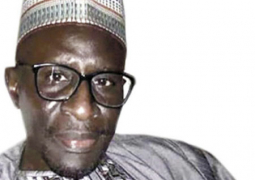
The
Food and Agriculture Organization (FAO) and the Government of The Gambia
through the Ministry of Agriculture recently signed an agreement for the
implementation of Technical Cooperation Programme (TCP) project of over D17
million geared towards support for capacity development in conducting a
livestock census in The Gambia.
This
was in response to a request from the Gambia Government to help address the
current paucity of livestock data in the country.
It was based on this that the FAO provided the
funding to conduct a national livestock census through TCP at the tune of
US$400,000.
The
Department of Livestock Services under the Ministry of Agriculture is the
implementing agency for the project.
Speaking
at the signing ceremony, the FAO country representative, Perpetua
Katepa-Kalala, expressed honour to be part of the FAO technical cooperation
programme on support to capacity development in conducting a livestock census
in The Gambia.
She
also expressed FAO’s satisfaction to the Government of The Gambia for its firm
commitment to the priority it gives to matters regarding agricultural
development and food security.
“We
know that political will is the foundation stone for national food security, as
well as economic and social development,” she said.
In The Gambia, livestock contributes
significantly to the national economy and livelihood of the population, with a
potential to make a significant contribution to improvement of food security,
she added.
In all, the livestock sector contributes about
30 per cent of the agricultural GDP and about 10 per cent to the national GDP,
she said.
“The
livestock sector has the potential to provide even more opportunities for
employment and income generation, as well as meeting the demand for animal and
animal products for the rural population, the growing urban population and the
tourism/entertainment industry.”
There
is increased awareness of the important role of livestock in The Gambia’s
economy as different livestock species are used as food, wealth and security,
as well as for land cultivation, transportation of goods and people in rural
areas, to provide manure for fuel and crop production.
Thus,
livestock’s important contribution to the welfare of the people beyond the
production of meat, milk, eggs and skin, could not be overestimated.
It
could be said that presently, decisions on livestock development are based on
data from the last livestock census of 1993, which probably does not accurately
depict the current situation.
The
absence of reliable and accurate data adversely affects the ability to
formulate effective policies regulation and decisions, and key among these are
investment decisions in the sector by private and public sector operators, as
well as other stakeholders such as farmer organisations.
She
said there is an urgent need to conduct a livestock census as they together
strive to attain the food security and economic and social development goals
set in Vision 2020, Vision 2016, the PAGE and the global Sustainable
Development Goals.
The
census would also support the establishment of an animal resources data
management structure to coordinate national livestock data, she added.
The formation of the national livestock policy
hub and the national Animal Resources DATA Management platform are consistent
with priorities enshrined in national document, and are clear indications of
the government’s commitment to improving the livestock sector.
She
said the TCP project being singed represented a contribution from FAO of
D17,252,000.00 (Seven million two hundred and fifty thousand dalasi).
She
added that the project was designed by department of Livestock Services with
technical support from FAO.
“It
is fully aligned by the department of Livestock Services with technical support
from FAO.”
The
FAO official further gave assurance of FAO’s dedication to assisting the
Department of Livestock Services in the successful implementation of this TCP,
and had already engaged its people of technical experts in agriculture
statistics.
Through
the FAO-Gambia office, the department of livestock services would have FAO
experts at their disposal, who have the expertise and professional experience
to provide adequate technical support, while at the sometime enhance the
technical adequate technical capacity of partner department as needed.
Also
speaking, the deputy Minister of Agriculture, Sheriffo Bojang, thanked FAO for
the continuous support to the agricultural sector, which has the enormous
potential to make significant contribution in employment creation, empowerment
and increasing food security.
Despite
its leverage potentials, the livestock sector in Africa has been constrained by
unfavourable and weak implementation capacity of policies, regulation and
standards, disease, lack of animal health and production data and the
deterioration of the natural habitat of our indigenous animal Genetic Resources
due to deforestation such as bushfires, overgrasing and low-rainfall.
According
to him, the available data on livestock are insufficient to formulate and
implement the necessary public and private sector investment to unlock the
sector potential.
Livestock
contribute to human food and nutrition security by providing high nutrient
density and nutritional quality food, as well as by increasing crop output
through the provision of manure.
He
said the signing was a Gambia government and FAO collaboration effort to have
accurate livestock data to be used as an essential tool for planning policy
formulation and legislation, promotion of trade and for advocacy to attract and promote investment and resources
allocation to the livestock sector for development purposes.
He
thanked FAO for supporting The Gambia in conducting this census, as well as
building the national capacity to conduct future censuses.
The
Director General of the Department of Livestock Services, Dr Duto Sainey
Fofana, commended FAO for the partnership, adding that this was not the first
time for FAO to sign an agreement to implement such a project with the
government of The Gambia.
He
assured FAO of his office’s readiness in the successful implementation of the
project, while dilating on the importance attached to livestock and its
potential in the economy of The Gambia.



